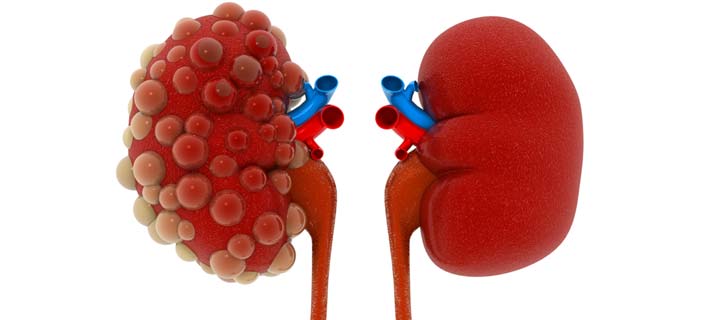Polycystic kidney disease type 1 (PKD1) and type 2 (PKD2) typically manifests in adults, after the age of 18 and usually leads to end stage renal disease by the age of 60 years. It is expressed through multiple clinical signs, such as bilateral renal cysts, cysts in other organs including the liver, the seminal vesicles and the pancreas, as well as vascular abnormalities, such as intracranial aneurysms, aortic root dilation and mitral valve prolapse. Renal manifestations include hypertension, renal pain, and renal failure. However, there is considerable variability in the severity of renal disease and of other extra-renal abnormalities in patients even within the same family.
Diagnosis is established primarily by imaging of the kidneys and genetic testing is recommended in order to to confirm the diagnosis, since there are many other conditions that can be associated with similar renal symptoms. Approximately 85% of patients harbor a mutation in the PKD1gene (OMIM 601313) and the remaining is due to mutations in the PKD2 gene (OMIM 173910). Polycystic kidney disease type 1 and 2 is inherited as an autosomal dominant genetic disorder and ~10% of cases are due to de novo mutations (i.e. not inherited from a parent).
Polycystic kidney disease, autosomal recessive, (ARPKD) belongs to a group of related hepato-renal diseases and is associated with increased morbidity and mortality in children. The organs affected mostly are the kidneys and the liver, while secondary abnormalities are observed in several other organ systems. The majority of the affected individuals exhibit clinical symptoms in the early neonatal period, while through detailed obstetric ultrasonography the diagnosis may be suspected prenatally when renal abnormalities are detected in the fetus. Severely affected fetuses exhibit ‘Potter-like’ oligohydramnios with severe pulmonary hypoplasia and massively enlarged echogenic kidneys. Because of the considerable clinical variability of the disease, diagnosis and manifestation of ARPKD may occur at any stage during childhood and only rare cases do not present symptoms until adolescence or adulthood.
A suspicion for ARPKD is based on the clinical findings of the patient and the simultaneous absence of renal disease in the parents. Genetic testing for PKHD1gene (OMIM 606702) mutations associated with the disease is ultimately required to confirm the diagnosis. Usually, as in most autosomal recessive genetic diseases, the parents of an ARPKD patient are both healthy/asymptomatic carriers of a PKHD1 gene mutation.
Finally, it is worth noting that there exist a relatively large number of genetic diseases with clinical symptoms which include, among others, renal abnormalities and cysts of the kidneys and/or liver.
We perform DNA sequence analysis, via Next Generation Sequencing (NGS) on a Genome Analyzer – Ion Proton platform, of all exons and intron-exon junctions/splice sites of the PKD1, PKD2 & PKHD1 genes, allowing us to detect, through the use of specially developed bioinformatics tools, >98% of all pathogenic mutations of the genes and the associated syndromes.
Where possible and/or necessary, we carry out additional MLPA analysis in order to detect deletions/duplications of the genes (please consult the final test report).
The test is highly sensitive and complex, so it is necessary that the results are assessed by a specialized team of clinical and molecular geneticists, in order to ensure safe and reliable testing.
Proper clinical genetic assessment and genetic counseling, both before and after testing, is essential in order to determine the optimum testing strategy and also to communicate properly the concepts of pathological and normal.

